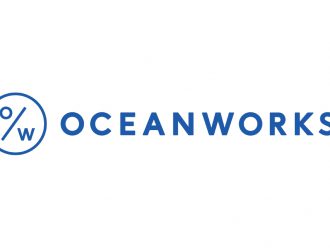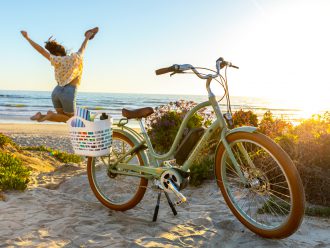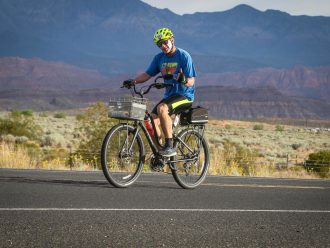- Sustainability
- June 3, 2021
- Electra Bicycle Company
What is your name and job title at Lonely Whale?
Dune Ives, CEO of Lonely Whale
Give us a brief overview of what Lonely Whale is doing to be a sustainable company.
At Lonely Whale, our primary focus is to spark deep, lasting behavior change in youth, adults and corporations through optimistic, lively and educational campaigns and programs that help people and help the planet. We collaborate with partners around the world to change how we talk about ocean conservation and to explore the real human causes behind the environmental issues we face today. We partner with organizations, influencers and creatives to launch data-driven campaigns that speak to Gen Z, Millennials, and others who have joined us in taking key actions to save the ocean. Lonely Whale is also committed to making the movement for a healthy ocean anti-racist, more diverse and open to all.
Through our work with NextWave Plastics, a consortium of companies we convene, we are helping members meet ambitious commitments to reclaim and recycle ocean-bound plastic into new products. NextWave members are on track to prevent 25,000 metric tons of plastic from entering the ocean. Alongside Captain Planet Foundation, we are on target to reach 100,000 youth change-makers by 2025 through Ocean Heroes Bootcamp. And most recently, we launched the Tom Ford Plastic Innovation Prize, powered by 52HZ, to address the single-use plastic that makes up 46% of pollution bleeding into our ocean: thin-film plastic.
We often say that Lonely Whale thinks like a leading brand, “selling” the concept of a healthy ocean and demonstrating real opportunities to benefit ocean health in a way that speaks to people’s shared experience and meets them where they are – resulting in not just one action but multiple actions to address ocean degradation.
Why does making sustainable business decisions matter to you and Lonely Whale?
The ocean is being choked by a relentless influx of plastic, but we have the tools to turn the tide. As Amanda Gorman so beautifully put it in her poem “Ode to our Ocean,” distributed in partnership with Lonely Whale, Atmos and Future Earth on World Oceans Day 2020, “The story of the ocean and the story of humanity are one in the same.” Lonely Whale is committed to advancing cultural and systemic changes for a future with clean seas to protect the ocean, a giver of life, for generations to come.
Member companies of NextWave Plastics, who are continuously building the first global network of ocean-bound plastic supply chains, are advancing those systemic changes. This is important because it creates a standard for other companies and industries to follow and also gives consumers even more opportunities to make the right choices when it comes to their purchasing power.
At what point in your life did you become committed to saving the planet?
I spent nearly three years at the helm of Paul Allen’s Vulcan Philanthropy, designing and then leading his first global environmental philanthropic portfolio. There was one question he asked our Executive Team that has perplexed me ever since – “How do you get people to care for the ocean?” He knew as a philanthropist and businessman that until people truly cared for the ocean, we will continue to degrade its health. I am a psychologist by trade, so this question hit home for me and has truly guided my professional journey and purpose ever since.
When I was first introduced to Lonely Whale and its founders Adrian Grenier and Lucy Sumner, I found we had a shared passion for creating content that really engages both the hearts and minds of people around ocean health. Perhaps by doing so we could begin to create care for the ocean and ultimately for each other and make more impact more quickly.
The best campaigns attract attention and get individuals to take action. But what Adrian and Lucy were interested in – which really sparked a fire in me – was how to create a brand for the ocean that is so sticky, that as “consumers” of the ocean, we never see ourselves as separate from it. It was incredible to land with the Lonely Whale team, which is committed to creating persistent action and impact that isn’t just a one-time thing.
What does living sustainably mean to you?
Our oceans provide us with every aspect of our livelihoods – from the food on our tables, to the jobs we work and the climate we experience each day. Some alarming statistics for you: There are a total of 5 trillion pieces of plastic in the ocean today, and by 2050, the ocean will contain more plastic than fish by weight. That’s in less than 30 years.
Living sustainably to me means providing a cleaner, healthier, environmentally-friendly community for all, whether it’s for the fish in the sea, our green earth or the human population. I stress the importance of living sustainably not just for my own future, but for my son’s future, all of our children’s future, and everyone and every living thing in between.
The oceans won’t clean themselves. It’s up to us, every single day, to make the choice that a healthy and clean planet is a priority for us and for our children’s future.
What is one sustainable lifestyle habit that you practice in your day-to-day life you think everyone else can do too?
It’s common to feel frustrated, helpless, and not even know where to begin with such a big issue like plastic pollution or sustainable living. But it’s important to always remember that every individual, and every individual action, matters.
There is no one way to do things, but there are many ways to do the right things. For me, I began my sustainability journey by mastering one change at a time, such as refusing a single-use plastic straw at a restaurant (500 million are used by Americans every day!) or bringing my reusable water bottle with me wherever I go. By selecting one thing to change first, I could then gradually, but successfully, build upon it with a second change. Then another, and another. We encourage individuals to start small, because small steps achieve big goals. Additional sustainable habits could be bringing your reusable bag to the grocery store, buying products that come in reusable and returnable containers and eliminating the use of thin-film plastics or single-use, resealable sandwich bags (SRSBs). In fact, the average U.S. family uses between 500 and 1,500 disposable SRSBs every year – equating to between 40 and 125 billion thrown out annually – and most aren’t aware that they cannot be recycled.
Ask a friend to join you in your cause so you have someone to hold you accountable and to make it more fun! If you live near water, participate in beach, river or lake clean-ups around your community and encourage others to eliminate single-use plastics. Plastic is solvable, and sustainability is possible.
What’s your favorite wild animal that you’d love to see survive and thrive on a green planet?
Over 700 species of marine animals have been negatively affected by plastic pollution in some way. I’d be remiss if I didn’t say I’d like to see my favorite wild animal, the narwhal, the unicorn of the sea swim through a sea of clean water – not a sea of plastic.



